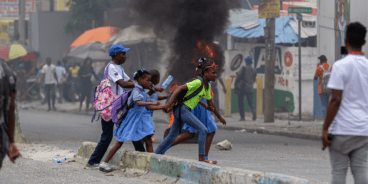
Enhancing Preventive Strategies: 6th Annual R2P Ministerial Meeting
Coinciding with the opening of the 68th United Nations General Assembly, the governments of the Netherlands and Nigeria, in association with the Global Centre for the Responsibility to Protect, co-hosted the 6th annual Ministerial Meeting on the Responsibility to Protect (R2P). The meeting opened with statements from the two co-hosts: the Minister of Foreign Affairs of the Kingdom of the Netherlands, H.E. Mr. Frans Timmermans, and the Minister of Foreign Affairs of the Federal Republic of Nigeria, H.E. Professor Viola Onwuliri.
Ministers representing eleven governments from across the globe participated in the meeting. The UN SecretaryGeneral’s Special Adviser on the Prevention of Genocide, Mr. Adama Dieng, also attended and delivered remarks on behalf of the Secretary-General. The 2013 meeting was also notable for the large number of countries attending as high-level observers, twenty states in total.
This year’s Ministerial Meeting sought to expand upon the discussion of national preventive measures discussed in the UN Secretary-General’s 2013 report on R2P, State responsibility and prevention, and the subsequent UN General Assembly Interactive Dialogue on the report, held on 11 September.
Key Themes
Making Prevention Mechanisms an Operational Reality
Participants agreed that the prevention of grave human rights abuses and mass atrocity crimes remains at the heart of R2P and is the best means to avoid coercive intervention by the international community. Several states acknowledged that while prevention of mass atrocities draws less public acclaim than halting ongoing crimes, it should remain a primary goal of states today. One minister noted that prevention under R2P “is happening everywhere all the time, but we don’t always notice – any crisis that doesn’t exist is so because pillar one works.”
A key theme of the discussion was that no country is immune to risk factors that contribute to mass atrocity crimes. States need to identify vulnerable groups and establish national mechanisms for responding to the risks they face. Some participants placed special emphasis upon creating inter-institutional mechanisms within government to address issues such as xenophobia and the suppression of the rights of marginalized groups.
Several participants emphasized the value of the R2P Focal Points initiative in reinforcing the efficacy of preventive mechanisms. In their individual capacity R2P Focal Points help bring the operational reality of mass atrocity prevention across all government work and promote preventive efforts. Participants also discussed how the Global Network of R2P Focal Points can build connections between states with a common atrocity prevention goal, with one minister indicating his hope that other members of the network would share best practices and help enhance the preventive capacity of his own state.
Several states discussed how broader bilateral and regional relationships can be developed so that states can aid in developing each other’s capacity to prevent mass atrocities. New mediation initiatives in the Mediterranean and prevention mechanisms undertaken by ECOWAS were highlighted as examples of these connections.
Establishing Good Governance, Rule of Law and Respect for Human Rights
A number of states welcomed the UN Secretary-General’s 2013 report on R2P, acknowledging that it presents practical options that already exist within the conflict prevention toolbox for states to use in preventing mass atrocity crimes. Though the existing toolbox is expansive, several states argued that more needs to be done to develop mechanisms that address root-cause prevention.
Among the mechanisms highlighted in the Secretary-General’s report, participants focused on what states can do to prevent atrocities through good governance, rule of law and respect for human rights. Several states noted that in terms of building the stability necessary to prevent atrocities, strengthening institutions for good governance, rule of law and human rights can serve as a goal on their own. While addressing the rule of law, some states drew upon their own history of mass atrocities to establish why accountability for past crimes plays an important role in the prevention of future atrocities.
Participants also noted that the weakening of good governance and rule of law can serve as a clear indicator for a developing risk of mass atrocities. Several states acknowledged that the deterioration of human rights can be a trigger for more widespread and systematic crimes – and that in these moments it is essential for preventive efforts to be reinforced by the international community.
Energizing R2P discussions at the United Nations
One minister noted that R2P often emerges in UN discussions too late, when prevention has already failed. In this regard, several states welcomed the announcement that the UN Special Adviser on the Responsibility to Protect is prioritizing mainstreaming R2P within the UN system.
Several states indicated a desire to see more action from the UN General Assembly and Security Council with regard to mass atrocity prevention. One minister discussed the need to institutionalize the annual General Assembly Interactive Dialogue on R2P as a formal debate with an outcome document. Others emphasized the need for the Security Council to uphold its Responsibility to Protect, particularly with regards to the situation in Syria, where timely and decisive action is still necessary to prevent further atrocities. Several ministers called for members of the Security Council to refrain from exercising their veto in mass atrocity situations and to fight impunity with an ICC referral when other measures have failed.
Conclusion
The diversity of countries who participated at the ministerial level and the number of observer countries indicates the growing importance states give to the annual Ministerial Meeting on the Responsibility to Protect. The co-hosts welcomed the dialogue as well as the willingness of participants to offer their diverse opinions. The co-hosts noted that one key outcome of the meeting was that while participants approach R2P from different angles, there is a significant convergence of commitment with regards to strengthening our shared global capacity to prevent mass atrocities.
Related Content


11th Meeting of the Global Network of R2P Focal Points Outcome Document
